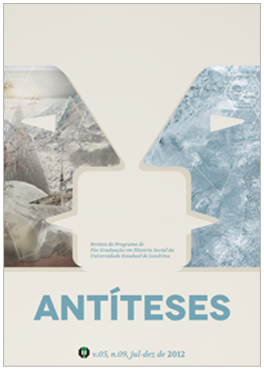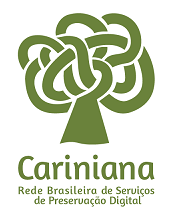Ação Histórica como um Problema para Pesquisadores em Educação em História
DOI:
https://doi.org/10.5433/1984-3356.2012v5n10p537Palavras-chave:
Educação histórica, Ação histórica, Aprendizagem histórica, Conceitos de segunda ordemResumo
Neste trabalho, estou lidando com problemas conceituais, dirigindo atenção para o conceito de segunda ordem "ação histórica", o qual foi primeiro identificado como importante para compreensão histórica, mas recebeu pouca atenção subsequente de pesquisadores de educação em história, apesar da atenção dada por parte dos filósofos, sociólogos e historiadores. Este é um termo fundamentalmente contestado e o conteúdo deste trabalho consiste em uma exploração de inúmeros desafios lançados por eles. No final, apesar de dilemas conceituais não resolvidos, vou sugerir possibilidades para a pesquisa empírica sobre ação histórica que talvez possam ajudar a educação histórica e contribuir para um ensino e aprendizado de história mais ativo, útil e significativo.Downloads
Referências
BLOOM, Allan. The closing of the american mind. New York: Simon and Schuster, 1987.
BURY, John Bagnell. The idea of progress. New York: Macmillan, 1932.
BUTLER, Judith. Contingent foundations: feminism and the question of "postmodernism". In: CARUTH, Cathy; ESCH, Deborah (ed.). Reference and responsibility in deconstructive writing. New Brunswick: Rutgers University Press, 1995. p. 213-232.
CALFEE, Robert C. (Ed.). The handbook of educational psychology. New York: Macmillan, 1996. p. 284-305
CARLYLE, Thomas. On heroes, hero-worship and the heroic in history. Lincoln: University of Nebraska Press, 1966.
CRONON, William. A place for stories: nature, history, and narrative. Journal of American History, Bloomington, v. 78, n. 4, p. 1347-1376, 1992.
DAVIS, Natalie Zemon. Slaves on screen: film and historical vision. Toronto: Vintage Canada, 2000.
FOX, Richard Wightman; LEARS, T. J. Jackson. The Culture of consumption: critical essays in American history, 1880-1980. Pantheon Books: 1983.
FRISCH, Michael. (ed.). A shared authority: essays on the craft and meaning of oral and public history. Albany: State University of New York Press, 1990.
GADAMER, Hans-Georg. The problem of historical consciousness. In: RABINOW, Paul; SULLIVAN, William M. (ed.). Interpretive social science: a second look. Berkeley: University of California Press, 1987. p. 82-140.
GENOVESE, Eugene Dominic. Roll, Jordan, roll: the world the slaves made. New York: Random House, 1974.
GIDDENS, Anthony. The constitution of society. Berkeley: University of California Press, 1984.
GREEN, James R. Taking history to heart: the power of the past in building social movements. Amherst: University of Massachusetts Press, 2000.
HAHN, Carole L. Becoming political: comparative perspectives on citizenship education. Albany: State University of New York Press, 1998.
HALLDEN, Ola. On the paradox of understanding history in an educational setting. In: LEINHARDT, Gaea; BECK, Isabel L.; STAINTON, Catherine (ed.). Teaching and learning in history. Hillsdale: Lawrence Erlbaum, 1994. p. 27-46.
LASCH, Christopher. The culture of narcissism: american life in an age of diminishing expectations. New York: Norton, 1979.
LEE, Peter; ASHBY, Rosalyn. Progression in historical understanding among students ages 7-14. In: STEARNS, Peter N.; SEIXAS, Peter; WINEBURG, Sam (ed.). Knowing, teaching, and learning history: national and international perspectives. New York: New York University Press, 2000. p. 199-222.
LEVSTIK, Linda S.; BARTON, Keith C. Doing history: investigating with children in elementary and middle schools. 2. ed. Mahwah: Lawrence Erlbaum, 2001.
LINENTHAL, Edward T. History wars: the enola gay and other battles for the american past. New York: Metropolitan Books, 1996.
LOMAS, Tim. Teaching and assessing historical understanding. London: The Historical Association, 1990.
LOWENTHAL, David. The Past is a foreign country. New York: Cambridge University Press, 1986.
NIETHAMMER, Lutz. Posthistoire: has history come to an end? London: Verso, 1992.
NOVICK, Peter. That noble dream: the "objectivity question" and the american historical profession. Cambridge: Cambridge University Press, 1988.
PHILLIPS, Mark Salber. Society and sentiment: genres of historical writing in britain. Princeton: Princeton University Press, 2000.
POPKEWITZ, Thomas S. Knowledge, power and curriculum: revisiting a TRSE argument. Theory and Research in Social Education, Binghamton, v. 26, n. 1, p. 83-101, 1998.
PRAKASH, Gyan. Subaltern studies as postcolonial criticism. American Historical Review, Washington, v. 99, n. 5, p. 1475-1490, 1994.
RÃœSEN, Jorn. The development of narrative competence in historical learning: an ontogenetic hypothesis concerning moral consciousness. History and Memory: Studies in Representation of the Past, Bloomington, v. 1, n. 2, p. 35-59, 1989.
SCHUTZ, Aaron. Teaching freedom? postmodern perspectives. Review of Educational Research, Washington, v. 70, n. 2, p. 215-251, 2000.
SCOTT, Joan Wallach. Glassworkers of carmaux: french craftsmen and political action in a 19thcentury city. Cambridge: Harvard University Press, 1974.
SEARLE, John. Intentionality: an essay in the philosophy of mind. Cambridge: Cambridge University Press, 1983.
SEIXAS, Peter. Conceptualizing the growth of historical understanding. In: OLSON, David R.; TORRANCE, Nancy (ed.). Handbook of education and human development: new models of learning, teaching, and schooling. Oxford: Blackwell, 1996. p. 765-783.
SWIFT, Graham. Waterland. London: Macmillan, 1992.
SZTOMPKA, Piotr (Ed.). Agency and structure: reorienting social theory. Yverdon: Gordon and Breach, 1994.
TAYLOR, Charles. Human agency and language. Cambridge: Cambridge University Press, 1985.
TAYLOR, Charles. Sources of the self: the making of modern identity. Cambridge: Harvard University Press, 1989.
TAYLOR, Charles. The malaise of modernity. Toronto: Anansi, 1991.
THOMSON, Edward Palmer. The making of the english working class. New York: Vintage, 1966.
TORNEY-PURTA, Judith; SCHWILLE, John; AMADEO, Jo-Ann. Civic education across countries: twenty-four case studies from the IEA civic education project. Amsterdam: International Association for the Evaluation of Educational Achievement, 1999.
WERTSCH, James V. Mind as action. New York: Oxford University Press, 1998.
WINEBURG, Samuel. The psychology of learning and teaching history. In: BERLINER, David C.; CALFEE, Robert C. (ed.). The handbook of educational psychology. New York: Macmillan, 1996. p. 284-305.
Downloads
Publicado
Como Citar
Edição
Seção
Licença
Copyright (c) 2012 Antíteses

Este trabalho está licenciado sob uma licença Creative Commons Attribution 4.0 International License.
A Revista Antíteses adota a Licença Creative Commons Attribution 4.0 International, portanto, os direitos autorais relativos aos artigos publicados são do(s) autor (es), que cedem à Revista Antíteses o direito de exclusividade de primeira publicação.
Sob essa licença é possível: Compartilhar - copiar e redistribuir o material em qualquer suporte ou formato. Adaptar - remixar, transformar, e criar a partir do material, atribuindo o devido crédito.
https://creativecommons.org/licenses/by/4.0/












